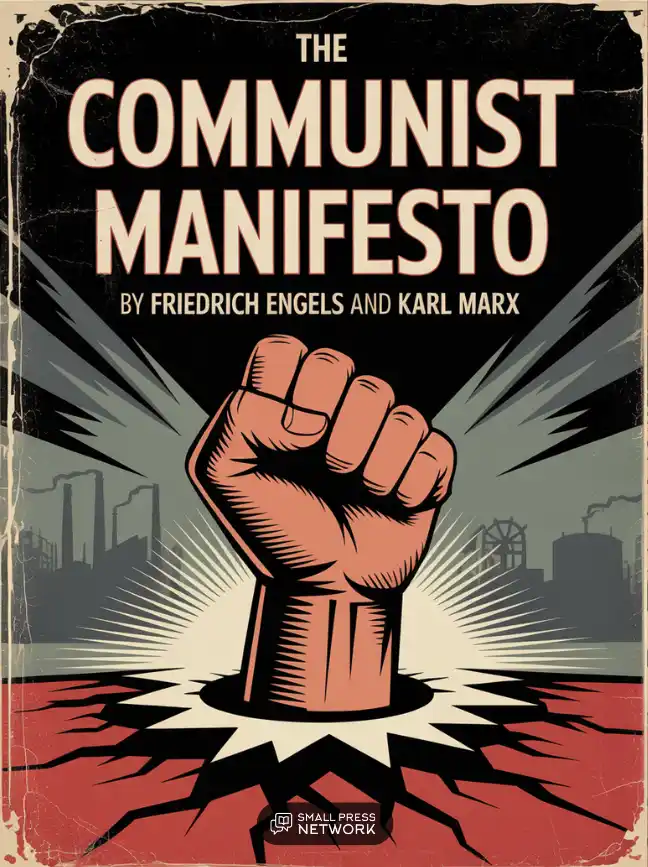It was a sweet finish after the bitter pills of floggings and bullets with which these same governments, just at that time, dosed the German working-class risings.
While this "True" Socialism thus served the governments as a weapon for fighting the German bourgeoisie, it, at the same time, directly represented a reactionary interest, the interest of the German Philistines. In Germany the petty-bourgeois class, a relic of the sixteenth century, and since then constantly cropping up again under various forms, is the real social basis of the existing state of things.
To preserve this class is to preserve the existing state of things in Germany. The industrial and political supremacy of the bourgeoisie threatens it with certain destruction; on the one hand, from the concentration of capital; on the other, from the rise of a revolutionary proletariat. "True" Socialism appeared to kill these two birds with one stone. It spread like an epidemic.
The robe of speculative cobwebs, embroidered with flowers of rhetoric, steeped in the dew of sickly sentiment, this transcendental robe in which the German Socialists wrapped their sorry "eternal truths," all skin and bone, served to wonderfully increase the sale of their goods amongst such a public. And on its part, German Socialism recognised, more and more, its own calling as the bombastic representative of the petty-bourgeois Philistine.
It proclaimed the German nation to be the model nation, and the German petty Philistine to be the typical man. To every villainous meanness of this model man it gave a hidden, higher, Socialistic interpretation, the exact contrary of its real character. It went to the extreme length of directly opposing the "brutally destructive" tendency of Communism, and of proclaiming its supreme and impartial contempt of all class struggles. With very few exceptions, all the so-called Socialist and Communist publications that now ( ) circulate in Germany belong to the domain of this foul and enervating literature.
2. CONSERVATIVE, OR BOURGEOIS, SOCIALISM
A part of the bourgeoisie is desirous of redressing social grievances, in order to secure the continued existence of bourgeois society.
To this section belong economists, philanthropists, humanitarians, improvers of the condition of the working class, organisers of charity, members of societies for the prevention of cruelty to animals, temperance fanatics, hole-and-corner reformers of every imaginable kind. This form of Socialism has, moreover, been worked out into complete systems.
We may cite Proudhon's Philosophie de la Misere as an example of this form.
The Socialistic bourgeois want all the advantages of modern social conditions without the struggles and dangers necessarily resulting therefrom. They desire the existing state of society minus its revolutionary and disintegrating elements. They wish for a bourgeoisie without a proletariat. The bourgeoisie naturally conceives the world in which it is supreme to be the best; and bourgeois Socialism develops this comfortable conception into various more or less complete systems. In requiring the proletariat to carry out such a system, and thereby to march straightway into the social New Jerusalem, it but requires in reality, that the proletariat should remain within the bounds of existing society, but should cast away all its hateful ideas concerning the bourgeoisie.
A second and more practical, but less systematic, form of this Socialism sought to depreciate every revolutionary movement in the eyes of the working class, by showing that no mere political reform, but only a change in the material conditions of existence, in economic relations, could be of any advantage to them. By changes in the material conditions of existence, this form of Socialism, however, by no means understands abolition of the bourgeois relations of production, an abolition that can be effected only by a revolution, but administrative reforms, based on the continued existence of these relations; reforms, therefore, that in no respect affect the relations between capital and labour, but, at the best, lessen the cost, and simplify the administrative work, of bourgeois government.
Bourgeois Socialism attains adequate expression, when, and only when, it becomes a mere figure of speech.





